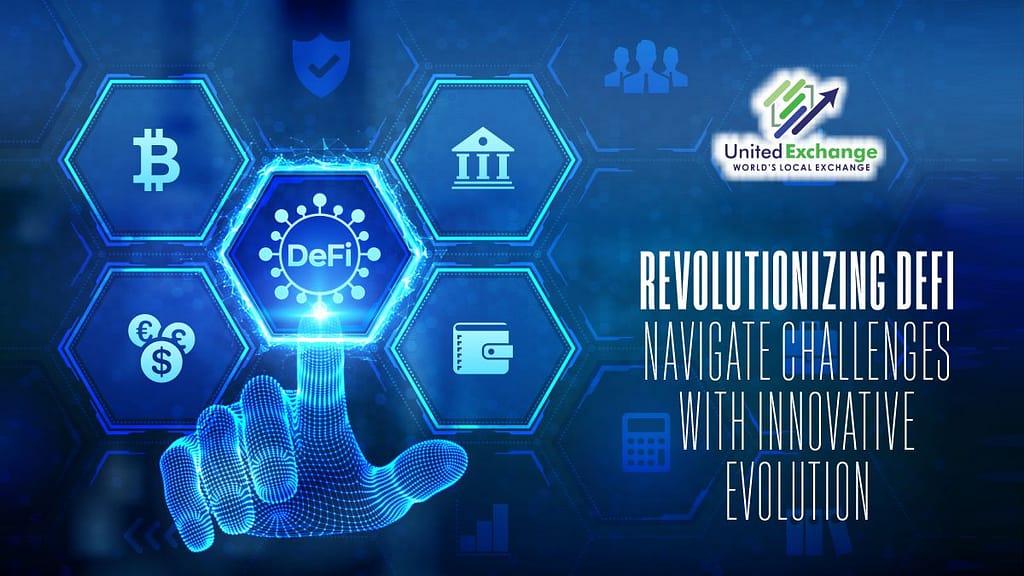Introduction:
Embark on a journey through the dynamic realm of decentralized finance, where cutting-edge advancements are reshaping the industry. Join us as we delve into ‘Revolutionizing DeFi: Navigate Challenges with Innovative Evolution’ to uncover the transformative strategies driving change. DeFi is also known as Decentralized Finance. It represents a financial system where transactions, lending, borrowing, and other financial activities occur directly between individuals or entities, facilitated by blockchain technology.
DeFi leverages smart contracts on blockchain platforms like Ethereum and Bitcoin to power decentralized exchanges. These exchanges enable users to trade cryptocurrencies directly with one another without relying on intermediaries like centralized exchanges. Smart contracts facilitate the execution of trades, ensuring that transactions occur securely and transparently.
Overview of challenges faced by DeFi platforms
DeFi platforms face a myriad of challenges, ranging from security vulnerabilities to regulatory uncertainties. Security breaches, such as hacks and exploits, pose significant risks to both users’ funds and the reputation of the platform. Moreover, the decentralized nature of DeFi makes it difficult to implement effective security measures. Regulatory concerns add another layer of complexity, as DeFi platforms often operate across jurisdictions without clear guidelines. Compliance with anti-money laundering (AML) and know your customer (KYC) regulations is a particular challenge, with potential legal repercussions for non-compliance.
Revolutionizing DeFi: The Evolution of DeFi
To address these challenges, the DeFi ecosystem is undergoing a remarkable evolution, marked by groundbreaking innovations across various fronts.
Enhanced Security Measures:
DeFi protocols are implementing robust security measures to fortify their platforms against malicious attacks. Enhanced auditing processes, bug bounty programs, and the adoption of formal verification techniques are bolstering the security posture of DeFi projects, instilling confidence among users.
Scalability Solutions:
Scalability remains a paramount concern for DeFi. It prompts the exploration of layer 2 scaling solutions such as sidechains, rollups, and state channels. By offloading transactions from the main blockchain, these solutions alleviate congestion and reduce transaction costs while enhancing the overall throughput of DeFi platforms.
Regulatory Compliance:
To navigate the evolving regulatory landscape, DeFi projects are increasingly embracing compliance frameworks and engaging with regulatory authorities to ensure adherence to legal requirements while preserving the core tenets of decentralization.
User-Centric Design:
Improving the user experience is pivotal for driving mass adoption of DeFi. Projects are focusing on intuitive user interfaces, seamless onboarding processes, and educational resources to empower users with the knowledge and tools needed to participate in DeFi safely and efficiently.
Importance of innovation in DeFi
Innovation plays a pivotal role in the decentralized finance (DeFi) landscape. It drives the evolution of financial services, offering groundbreaking solutions to age-old challenges. In DeFi, innovation fosters accessibility, transparency, and efficiency. It empowers individuals worldwide to participate in financial activities without intermediaries. Through continuous innovation, DeFi platforms can enhance security measures, optimize user experience, and introduce novel financial instruments.
Looking Ahead: The Future of DeFi
As DeFi continues to evolve, its transformative potential becomes increasingly evident. The convergence of innovative technologies, regulatory advancements, and community-driven initiatives is paving the way for a more resilient and inclusive financial ecosystem. DeFi is on the brink of reshaping the future of finance by creatively overcoming challenges. It empowers individuals worldwide with enhanced financial autonomy and accessibility.
DeFi (Decentralized Finance) is undergoing a rapid evolution. It reshapes traditional financial systems through decentralization and blockchain technology.
Expanding Access to Financial Services:
DeFi projects are democratizing access to financial services globally. It empowers individuals without traditional banking infrastructure.
Innovative DeFi Protocols:
Creative DeFi protocols are emerging, enabling novel financial instruments, such as decentralized exchanges (DEXs), lending platforms, and yield farming.
DeFi Interoperability: Bridging Chains:
Interoperability solutions are being developed to bridge different blockchain networks. It enhances liquidity and accessibility across DeFi ecosystems.
The Rise of Decentralized Autonomous Organizations (DAOs):
DAOs are gaining traction within DeFi, revolutionizing governance structures and decision-making processes through decentralized consensus mechanisms.
Regulatory Considerations in DeFi:
Regulatory frameworks are evolving to accommodate the decentralized nature of DeFi, balancing innovation with investor protection and regulatory compliance.
Scalability Solutions for DeFi:
Scalability remains a challenge for DeFi platforms, driving research and development efforts toward layer 2 solutions and blockchain scalability enhancements.
